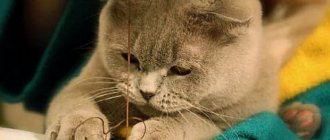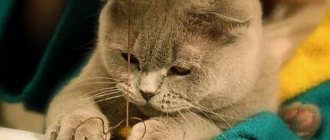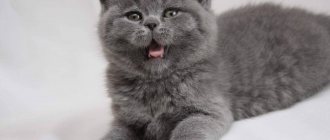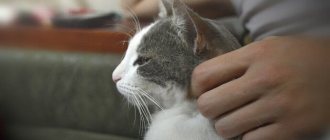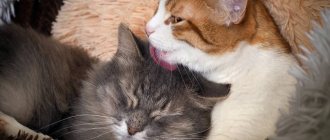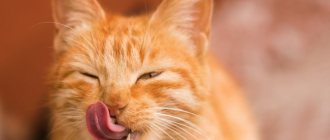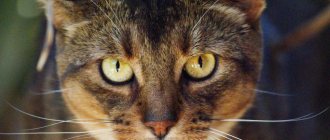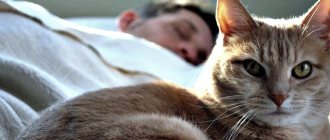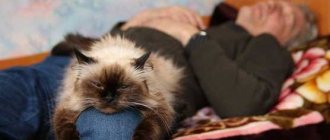Which breed and in what case is it better to choose?
It is better for a child to get a kitten than to introduce him to an adult cat.
For families with children, it is better to choose Scottish cats - kittens will get along well with children who already understand that a cat is a living creature and not a toy. "Scottish women" are completely devoid of sudden attacks of aggression. The British cat is suitable for busy people who respect the animal’s personal space. She will not behave aggressively with the child, but from an excess of attention to her person she will hasten to leave.
Video: the difference between Scottish and British cats
https://www.youtube.com/embed/Ra6sKc7Z9kw https://www.youtube.com/embed/ekiFbTEGalc
The Scottish cat breed is more suitable for families with children. In turn, the British one will fit perfectly into the life of a busy person who spends more time at work rather than at home.
Basic taming methods
It is recommended to take into account several rules on how to accustom a cat to your hands. They will help you achieve contact faster and not scare the baby.
Treats from hand
Treats received from human hands will allow the cat child to calm down and understand that no one will offend him. A well-fed baby relaxes and in most cases allows himself to be stroked or even picked up.
At the initial stage, you can give food from your hands, then put it on your lap. The desire to eat a treat will lead to the pet going to be picked up. However, you should not hold the animal if it wants to jump. This may alarm him and cause him discomfort.
Calm voice
Cats are calm animals, therefore it is recommended to talk to them quietly and affectionately, without any manifestation of aggression. The animal will feel the attitude and will approach the person without fear. Such pets really like affectionate speech, so they can easily be handled on their own.
Smells you like
You can attract your cat's attention with scents that are pleasant to him. A curious baby will definitely want to look at what smells so nice and will make contact with the person. In pet stores you can find special sprays containing specific pheromones that attract the animal. As a last resort, you can spray the solution on your palms and let the cat smell it.
Attention! It is not recommended to constantly use sprays that attract your pet to avoid addiction.
Education
When training and raising a kitten, you need to take into account its breed. It is recommended to be aware that not all breeds love affection. British and Scottish Fold cats are very independent and do not want to spend time in the arms of their owner. It is possible to accustom such animals to your hands, but it will require patience and a long time.
Don't forget about games
Sometimes a pet's overly intrusive, loud or gangster behavior is the result of boredom and unspent energy. Therefore, for a cat, there must be interactive toys and gaming complexes in the house: let him throw out all the crap while playing, instead of bothering the family. If you don’t have the money or space to install the complex and buy large toys, you can buy a regular tennis ball.
conclusions
Perhaps one day an arrogant British cat will jump onto your lap and delight you with her simple song. Despite their genetically inherent independence and self-sufficiency, British cats have the ability to be grateful and love their caring owner.
Every owner dreams of stroking and holding their pet on their lap. But why doesn’t the cat sit in your arms in response to affection, and even scratch, bite and growl with displeasure? Here are the main reasons for this behavior and ways to tame an animal and make it affectionate and gentle.
Otitis in fold-eared cats
Curled ears and a narrow ear canal are factors that contribute to the development of otitis externa in the Scottish Fold. By slowing down air circulation, the temperature and humidity in the ear increases.
This creates optimal conditions for the development of pathogenic microflora, which causes inflammatory processes.
Other root causes of otitis externa in Scottish Fold cats include:
Secondary causes include bacterial and yeast infections, as well as improper treatment of existing primary otitis media.
Symptoms of external otitis in Scottish Fold cats:
- hyperemia and swelling of the external ear;
- itching and soreness;
- the appearance of an unpleasant odor from the ear;
- increase in the amount of secretion released.
Methods for diagnosing external otitis in cats:
- inspection and palpation;
- otoscopy;
- microscopy of scraping secretions from the ear canal for the presence of parasites.
To identify structural anomalies and the presence of tumors in the middle and inner ear of Scottish Fold cats, radiography or video otoscopy is used. For the final examination, general anesthesia is used.
Treatment comes down to eliminating the cause of the disease and symptomatic therapy, which includes:
- sanitation of the external auditory canal with special lotions or warm saline;
- external anti-inflammatory drops;
- antimicrobial ointments.
Important! If the integrity of the eardrum is damaged, the use of drops is contraindicated. Therefore, it is strictly forbidden to self-medicate otitis media in cats.
When the animal's general body temperature increases, the veterinarian prescribes antibiotics.
If ticks are present, antiparasitic medications for cats are used.
The tumors are removed surgically, and allergic reactions are treated under the supervision of a doctor with diet and antihistamines.
If untreated, inflammation spreads to the middle and inner ear, melting of the structural elements of the organ occurs, which can lead to inflammation of the brain and meninges, as well as the development of sepsis when infection enters the blood.
Hypertrophic cardiomyopathy in Scottish Fold cats
With the development of hypertrophic cardiomyopathy in Scottish Fold cats, morphological changes occur in the tissues of the heart, which results in heart failure.
In most cases, a genetic or hereditary predisposition is identified as the root cause of the disease. Most often, pathology is recorded in males.
At the first stage of the disease, there are no symptoms. As cardiac hypertrophy develops, the Scottish Fold may experience shortness of breath and coughing that worsens during physical activity.
Important! In the absence of physical activity, cardiomyopathy is asymptomatic and ends in the sudden death of the animal.
Methods for diagnosing hypertrophic cardiomyopathy in cats are:
- radiography;
- electrocardiography;
- echocardiography.
If this disease is detected, the Scottish Fold cat is prescribed lifelong treatment, which includes taking beta-blockers and diuretics.
Very important! Unauthorized dose reduction or interruption of the course of using beta-blockers for this disease causes a “rebound effect”. It manifests itself in sudden jumps in blood pressure and heart rhythm disturbances, which can threaten the life of the animal.
Scottish Fold cats with this disease are rejected from breeding work and sterilized.
Love a cat
If you truly love your pet, you will never allow him to do anything that is harmful to him, you will never hit him, you will not forbid him to sleep next to you and do the like. And most importantly, you will not artificially limit his freedom, for example, by excessive caresses. The cat, in turn, always feels that he is loved and respected.
And cat love is designed in such a way that love will not arise for those whom the cat does not trust. Therefore, first of all, earn the trust of your pet. But if you already see that the cat loves and trusts you, rest assured: this is not an act, because cats do not know how to portray such emotions. Any others know how (for example, resentment), but love does not.
Do you have your own tips for raising a Scottish cat? Or, on the contrary, you are confused and don’t know what to do with the problem. Share this in the comments.
Source
What not to do
During the training process, you need to be careful and not show negative feelings so as not to scare the cat.
There are a number of actions that cannot be performed:
- Raise your voice, shout. Cats get offended very quickly and remember for a long time, so next time there will be no result at all. The animal will scratch, hiss and even bite.
- Show aggression, punish, deprive of food and attention. Such actions are also unlikely to give the desired result.
- Hold forcibly. If the pet begins to get nervous, wriggle out of his hands, and release his claws, then you need to let him out. Holding in one place causes the animal to panic and develop fear that will be difficult to overcome.
- It is better to protect kittens from small children. A child does not always understand how to behave correctly with an animal. As a result, both one and the other may experience stress.
The most important thing in the training process is calm. Cats are very sensitive to the mood of their owners and will also be nervous and worried.
It is easy to accustom a kitten to your hands while playing
Neat games
But “no brute force” also means that you should not allow the cat to be rude to you. Another tip on how to raise a Scottish Fold and Straight-eared kitten is that if he fights, bites, attacks you, tries to pull your hair, chases your legs under the blanket, this needs to be stopped. But not by force. First, just don't play with your kitten with your bare hands and feet. Secondly, if he attacks himself, you can flick him on the bridge of his nose, but not too hard. Or hiss. The hissing of a mother cat is used as an effective tool against kitten violence. Therefore, they are all afraid of such sounds: this means that the offended party is desperate and is ready to take any measures to protect itself.
How to distinguish fold-eared kittens from ordinary ones?
The chest is usually larger, and the legs and tail are shorter and thicker. Feel the kitten's nose - there should be no hump on the bridge of the nose. You also need to feel the tail - there should be no humps or knots on it. Buy a fold-eared cat in the cold season.
Interesting materials:
Do I need to update applications on my smartphone? Is it necessary to pick off the stems of bell peppers? Do I need to spray flowers in winter? Do I need to lighten my hair before dyeing it black? Do I need to unplug the surge protector from the outlet? Is it necessary to tear off the tails of rose hips? Is it necessary to renew the compulsory medical insurance policy? Do I need to show up at the employment center? Do I need to coat my nails with a base coat before applying extensions? Do I need to completely discharge a NiMH battery?
Prohibiting commands
Attempts to bite your arms and legs should be stopped firmly and unequivocally. The kitten is raised quite harshly by its mother, so your reluctance to encourage rough play will be accepted by the baby without offense.
Do not yell at the cat, otherwise it will become aggressive and will not trust its owner. The little kitten gets used to the new place and owner quickly. If the animal does something wrong, then you need to say the command “no” and lightly spank it. This breed loves to interact with people, and cats need to be played with regularly. One of the most effective methods of punishment is to scare the animal with a loud clap of your hands, a thrown newspaper, or splashes of water. A more severe punishment (for example, beatings or other physical impact) is unacceptable, since in this case the pet will not only not learn the lesson taught, but will also begin to fear the owner, ceasing to trust him.
If a person beats a cat in the heat of the moment, he should try to win her favor again with affection: the animal must be sure that, despite all the pranks, it is still loved.
Talkative pet
A separate article will be devoted to this problem on our website, but for now let’s say: if your pet is healthy and talks all the time, it’s not scary, he just might be a talker. There are some cats who comment on literally everything. But there are those who constantly manipulate you with their “meow”. In this case, you need to understand that they are doing this only because the technique works. If you basically ignore the kitty's cries, then she will understand that you can shut up, because... this will not have the desired effect on the owner. Of course, before you start ignoring, you need to find out if the cat is in pain: sometimes, by meowing, the pet tries to draw your attention to some problem.
A common problem is when a cat yells in the morning to wake up the owner. Most often this happens because he wants to eat. It is easy to wean your pet from this behavior. Firstly, don’t fall for his persuasion either, and secondly, don’t feed him immediately after you wake up. It's better to feed before going to work. Then the cat will not associate the owner’s awakening with food and will not wake him up.
Urinary tract diseases in Scottish Fold cats
Adult and castrated animals are prone to developing diseases of the genitourinary system. These include:
- idiopathic cystitis;
- urolithiasis disease;
- obstruction of the urethra in males and females.
The similarity of the symptoms of these diseases does not allow owners of Scottish Fold cats to independently make an accurate diagnosis. Therefore, consulting a doctor is necessary if the following clinical signs occur:
- pain when urinating, expressed by meowing or unnatural posture of the animal;
- increase or decrease in the number of acts of urination per day;
- the appearance of blood in the urine;
- cloudy urine;
- increased (changed) smell of urine;
- general lethargy, loss of appetite, inactivity.
Treatment for Scottish Fold cats depends on the type and stage of the disease and is prescribed only by a veterinarian.
To maintain the health of Scottish cats by preventing the formation of crystals and the development of inflammation, the following prevention methods are used:
- introduction of wet food into the diet;
- ensuring constant access to fresh water;
- preventing obesity;
- encouraging physical activity.
Since Scottish Fold cats have a predisposition to urological diseases, it is recommended to have their urine analyzed once every six months for timely detection of crystals and stones.
